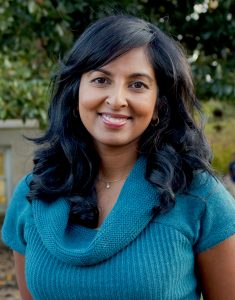Amarjit Budhiraja, Chairs Leadership Program Interim Director
Budhiraja provides leadership in program for department chairs
As interim director of the Chairs Leadership Pro gram, Amarjit Budhiraja is giving back to the program he called ‘a lifeline’ in his early days as chair.
gram, Amarjit Budhiraja is giving back to the program he called ‘a lifeline’ in his early days as chair.
Started in 2007, the Chairs Leadership Program (CLP) is a collaboration between the IAH and the College of Arts & Sciences. The yearlong program supports first-time and reappointed department chairs through monthly confidential conversations.
Budhiraja is a professor in the department of statistics and operations research, where he served as chair from 2014 to 2019. He noted the complexities that a department chair faced, beyond the scope of a teaching or research professor.
“You have no training, for example, of managing budgets, conflict resolution and personal issues that are extremely confidential and very sensitive,” Budhiraja said.
That’s where the CLP comes in.
Challenges for chairs
In addition to the support the College provides to chairs through a council, comprehensive manual and support from the Dean’s Office senior leadership, the CLP provides peer support to discuss challenges facing the individual department chairs.
“Chairs today must balance day-to-day research and instructional needs while thinking of the future of their department, and do all of this with finite resources,” said Elizabeth Engelhardt, the College senior associate dean for fine arts and humanities who oversees the Institute.
“The Chairs Leadership Program carves out a regular time on busy chairs’ schedules to step back and reflect. It helps chairs to stop juggling for just a moment, sit down, and get back to the fundamentals of leadership that led them to say yes to the role.”
When Institute director Patricia Parker approached him and asked him to fill the interim role, Budhiraja didn’t hesitate to say yes.
“I got so much from this program, and it gives me satisfaction knowing that I’ve given back to it in a small way,” said Budhiraja.
Leadership
According to his colleagues, Budhiraja is well-suited to take on his new leadership duties.
“He had a definite vision for the department and worked tremendously hard to advance the goals of our department in research and pedagogy. But at the same time, he took everyone along,” said Shankar Bhamidi, professor and director of graduate studies in the statistics and operations research department.
Nilay Argon, professor and director of graduate admissions, shared the same sentiment.
During Budhiraja’s tenure as chair, Argon served as diversity liaison. She said that Budhiraja was supportive of her efforts to promote diversity in the department, particularly through hiring.
“I think one of the most important characteristics of a good leader is being fair and equitable to all,” said Argon.
Facilitating connection, virtually
As interim director, Budhiraja balances other responsibilities, including teaching, advising and his own research in probability and stochastic analysis. But with over 20 years of experience in academia, it’s a realm where he feels comfortable.
This year’s CLP group have met twice via Zoom, with another two meetings planned for the semester. Before the pandemic, the meetings were in-person and over a meal, offering a comfortable and relaxed atmosphere.
Nevertheless, Budhiraja is glad to work with the new cohort of chairs, who can rely on resources and each other to work out complex issues and develop strategies that can apply to their daily work.
“A core philosophy of this program is peer coaching,” Budhiraja emphasized.
As program director, he said his role is not to dictate best practices, but to facilitate the discussion. “I help the conversation and the solutions come from the group.”
Budhiraja cherished the community of peers that formed from his CLP group and wants the current participants to walk away with the same feeling that he had from the program: that you don’t have to do everything alone.
***
Viji Sathy, Academic Leadership Program Director

Whether she’s teaching undergraduates or leading a workshop for faculty, Viji Sathy continues to focus on inclusion.
When she walks into a room, Viji Sathy asks herself two questions:
Who is not there, and why?
Who is not speaking, and why?
For her, these questions highlight the importance of equity and inclusion, whether in the classroom or leadership spaces.
In July, Sathy began a three-year term as director of the Ruel W. Tyson Academic Leadership Program.
“I have learned so much in this program and am honored to continue its rich tradition of giving Carolina faculty the opportunity to think critically about effective leadership and get to know more about themselves as leaders.”
Sathy was an ALP Fellow in Spring 2021, and she greatly appreciated the way the program allowed her and her cohort the time and space to explore leadership.
“It gave us a much-needed pause weekly to reflect on effective leadership, to check-in on each other, and perhaps most importantly, to foster a community that we can turn to time and time again to have meaningful conversations about our lives, goals and aspirations,” said Sathy.
As director, Sathy wants to bring the same care and attention to ALP gatherings, facilitating conversations that are comfortable and authentic.
“It not only gives me the opportunity to foster this with future cohorts, but also help shape the program by bringing the valuable lessons I have learned in my time at Carolina as an undergraduate, graduate student and faculty member.”
Sathy has been committed to helping faculty, whether it’s through workshops on inclusive teaching or creating tools to help them better understand their students. During the pandemic, Sathy trained University instructors to assist with the sudden shift to remote teaching. She was appointed as a Faculty Fellow for Inclusive Teaching by the Center for Faculty Excellence in 2020.
This year she spearheads a new program, the Townsend Program for Education Research, in the College’s Office of Undergraduate Education. The program’s strategic priority is using high-quality assessments and research designs to support College faculty as they conduct research about student programs and educational experiences.
As a fixed-term faculty member, Sathy recognizes the limited opportunities for campus leadership. At one ALP meeting last semester, a panel of former members shared the importance of letting others know you want to be considered for an open leadership position that interests you.
Even if you don’t get it, you’re informing people that it is the type of position that you want. Sathy took that lesson to heart when she learned about the search for the ALP director position in May.
“I am passionate about inclusion,” Sathy said. And with her upcoming book with biology teaching professor Kelly Hogan, Inclusive Teaching: Strategies for Promoting Equity in the College Classroom, “I’m gaining an interest for how we bring the lessons of inclusive teaching to facilitation and leadership.”
Now, in these leadership spaces, she asks new questions:
How do we cultivate a diverse set of leaders?
How do we change systems and structures to enable more people to see their leadership expertise?
These are questions she can’t answer on her own. With the help of current and future ALP Fellows, she hopes the answers will affect positive change for Carolina.
Viji Sathy is a Professor of the Practice in the Psychology and Neuroscience Department.
The Academic Leadership Program is now accepting applications for the 2022-2023 academic year, through Oct. 29. Learn more about the program and application requirements.
By Kristen Chavez, Institute for the Arts & Humanities
